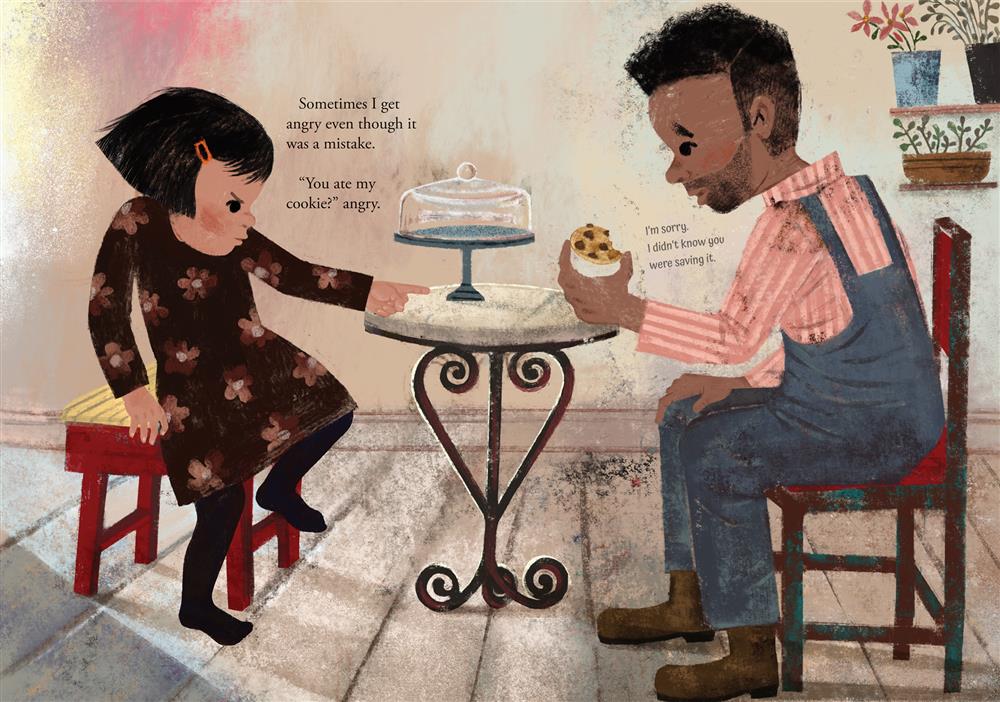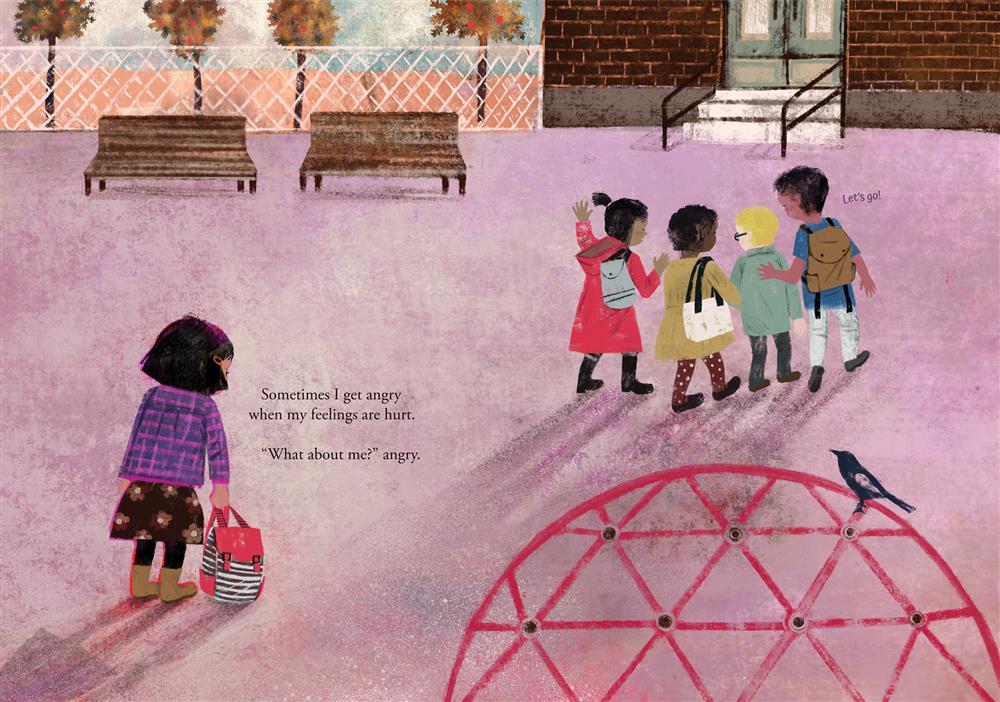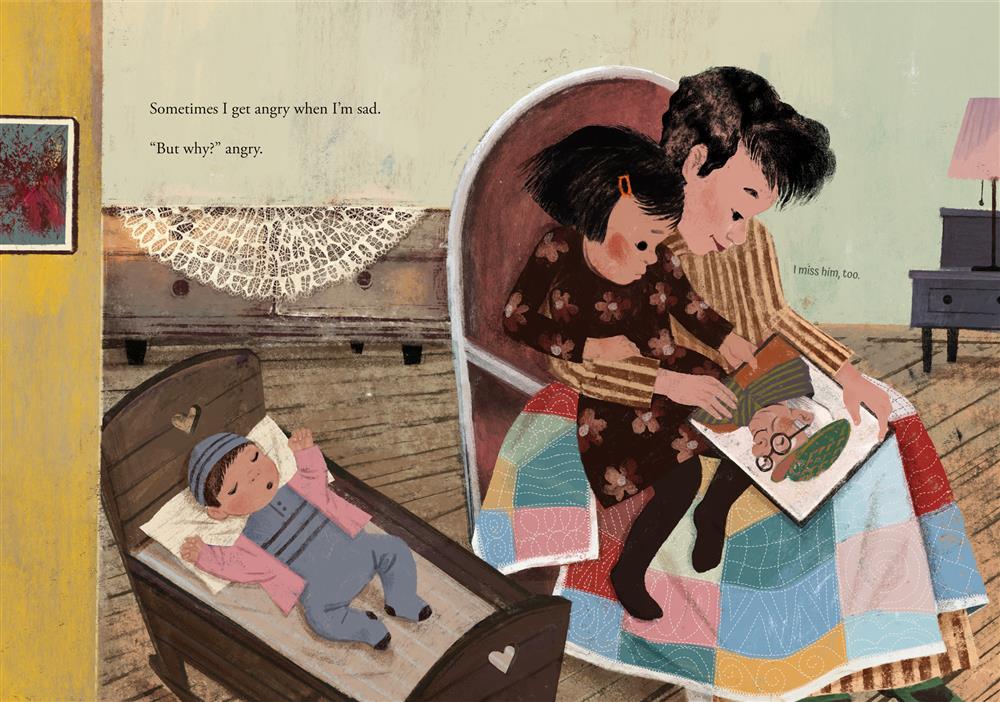A young child tells us what makes her angry and how she tries to let the anger come and go. An artful starting point for conversations about strong feelings.
“I get angry,” says a little girl, looking fiercely in the mirror. Sometimes she gets angry when someone is mean and tries to take her toy away, when it feels unfair that there’s not enough time to go swimming, when she’s tired and just wants to go home, or when the kids at school leave her out, hurting her feelings.
When she’s angry, she tries to remember to use her words — even though that doesn’t always work. Sometimes she can’t find the right words, or the words don’t come out the way she intends. But sometimes words do help, and when her anger melts away a new feeling can blossom.
Sandra Feder’s cleverly constructed text presents different situations in which a child might feel angry, creating a nuanced look at anger and its many underlying emotions. Rahele Jomepour Bell’s illustrations show a loveable, angry little girl, brimming with personality, who learns how to express herself as she moves through her feelings.
Key Text Features
dialogue
explanation
illustrations
vignettes
Correlates to the Common Core State Standards in English Language Arts:
CCSS.ELA-LITERACY.RL.K.7
With prompting and support, describe the relationship between illustrations and the story in which they appear (e.g., what moment in a story an illustration depicts).
CCSS.ELA-LITERACY.RL.1.2
Retell stories, including key details, and demonstrate understanding of their central message or lesson.
CCSS.ELA-LITERACY.RL.1.4
Identify words and phrases in stories or poems that suggest feelings or appeal to the senses.
CCSS.ELA-LITERACY.RL.1.7
Use illustrations and details in a story to describe its characters, setting, or events.
A young child tells us what makes her angry and how she tries to let the anger come and go. An artful starting point for conversations about strong feelings.
“I get angry,” says a little girl, looking fiercely in the mirror. Sometimes she gets angry when someone is mean and tries to take her toy away, when it feels unfair that there’s not enough time to go swimming, when she’s tired and just wants to go home, or when the kids at school leave her out, hurting her feelings.
When she’s angry, she tries to remember to use her words — even though that doesn’t always work. Sometimes she can’t find the right words, or the words don’t come out the way she intends. But sometimes words do help, and when her anger melts away a new feeling can blossom.
Sandra Feder’s cleverly constructed text presents different situations in which a child might feel angry, creating a nuanced look at anger and its many underlying emotions. Rahele Jomepour Bell’s illustrations show a loveable, angry little girl, brimming with personality, who learns how to express herself as she moves through her feelings.
Key Text Features
dialogue
explanation
illustrations
vignettes
Correlates to the Common Core State Standards in English Language Arts:
CCSS.ELA-LITERACY.RL.K.7
With prompting and support, describe the relationship between illustrations and the story in which they appear (e.g., what moment in a story an illustration depicts).
CCSS.ELA-LITERACY.RL.1.2
Retell stories, including key details, and demonstrate understanding of their central message or lesson.
CCSS.ELA-LITERACY.RL.1.4
Identify words and phrases in stories or poems that suggest feelings or appeal to the senses.
CCSS.ELA-LITERACY.RL.1.7
Use illustrations and details in a story to describe its characters, setting, or events.
| Published By | Groundwood Books Ltd — May 1, 2022 |
| Specifications | 32 pages | 8 in x 11.25 in |
| Keywords | little kids big feelings; anxiety; hurt feelings; kindness; behaviour modification; acceptance; sharing; empathy; good egg; bad seed; elise gravel; not me; jo witek; validating feelings; peter reynolds and susan verde; i feel teal; amy sicuro; mercer meyer; little critter i was so mad; |
|
Supporting Resources
(select item to download) |
Teacher's Guide |
| Written By |
SANDRA V. FEDER is the author of the highly acclaimed books in the Emotions and Me series, including Angry Me and Peaceful Me, illustrated by Rahele Jomepour Bell (Bank Street College of Education Best Children’s Books of the Year), and Shy Me and Lonely Me (the latter forthcoming in 2026), illustrated by Ashley Barron. Sandra’s other books include Bitter and Sweet, illustrated by Kyrsten Brooker (a PJ Library selection), and The Moon Inside, illustrated by Aimée Sicuro. She lives in California.
|
| Illustrated by |
RAHELE JOMEPOUR BELL is an Iranian-born illustrator and educator whose vivid, textured work explores cultural identity, migration and the richness of everyday life. She is a professor at the Kansas City Art Institute, teaching in the Illustration program. Her award-winning illustrations have appeared in Our Favorite Day of the Year by A. E. Ali and To Change a Planet by Christina Soontornvat, among others. Rahele has been a winner in the Bologna Illustrators Exhibition. She lives in Kansas. |
| Written By |
|
SANDRA V. FEDER is the author of the highly acclaimed books in the Emotions and Me series, including Angry Me and Peaceful Me, illustrated by Rahele Jomepour Bell (Bank Street College of Education Best Children’s Books of the Year), and Shy Me and Lonely Me (the latter forthcoming in 2026), illustrated by Ashley Barron. Sandra’s other books include Bitter and Sweet, illustrated by Kyrsten Brooker (a PJ Library selection), and The Moon Inside, illustrated by Aimée Sicuro. She lives in California.
|
| Illustrated by |
|
RAHELE JOMEPOUR BELL is an Iranian-born illustrator and educator whose vivid, textured work explores cultural identity, migration and the richness of everyday life. She is a professor at the Kansas City Art Institute, teaching in the Illustration program. Her award-winning illustrations have appeared in Our Favorite Day of the Year by A. E. Ali and To Change a Planet by Christina Soontornvat, among others. Rahele has been a winner in the Bologna Illustrators Exhibition. She lives in Kansas. |
| Audience | ages 3 to 6 / grades P to 1 |
| Reading Levels | Lexile AD450L |
| Key Text Features | dialogue; explanation; illustrations; vignettes |
| Common Core |
CCSS.ELA-LITERACY.RL.1.2
CCSS.ELA-LITERACY.RL.1.4 CCSS.ELA-LITERACY.RL.K.7 CCSS.ELA-LITERACY.RL.1.7 |
Commended, Cooperative Children's Book Center, CCBC Choices, 2023
“Artfully captures the nuances of anger.” — Shelf Awareness, STARRED REVIEW
“A valuable tool for teaching children the important skill of recognizing and naming feelings.” — Kirkus Reviews
“A fresh addition to teeming 'anger management' shelves.” — Booklist
“An effective springboard for discussing a topic that may be hard for young children to verbalize.” — School Library Connection
“Anger Me is an excellent example where both illustrations and text work in tandem with one another to create an interesting and pertinent experience for the young reader.” — CM: Canadian Review of Materials
“A wonderful book to share with young ones to talk about communication and let them know they are understood.” — Calgary Herald
A nuanced look at anger and its many underlying emotions.




